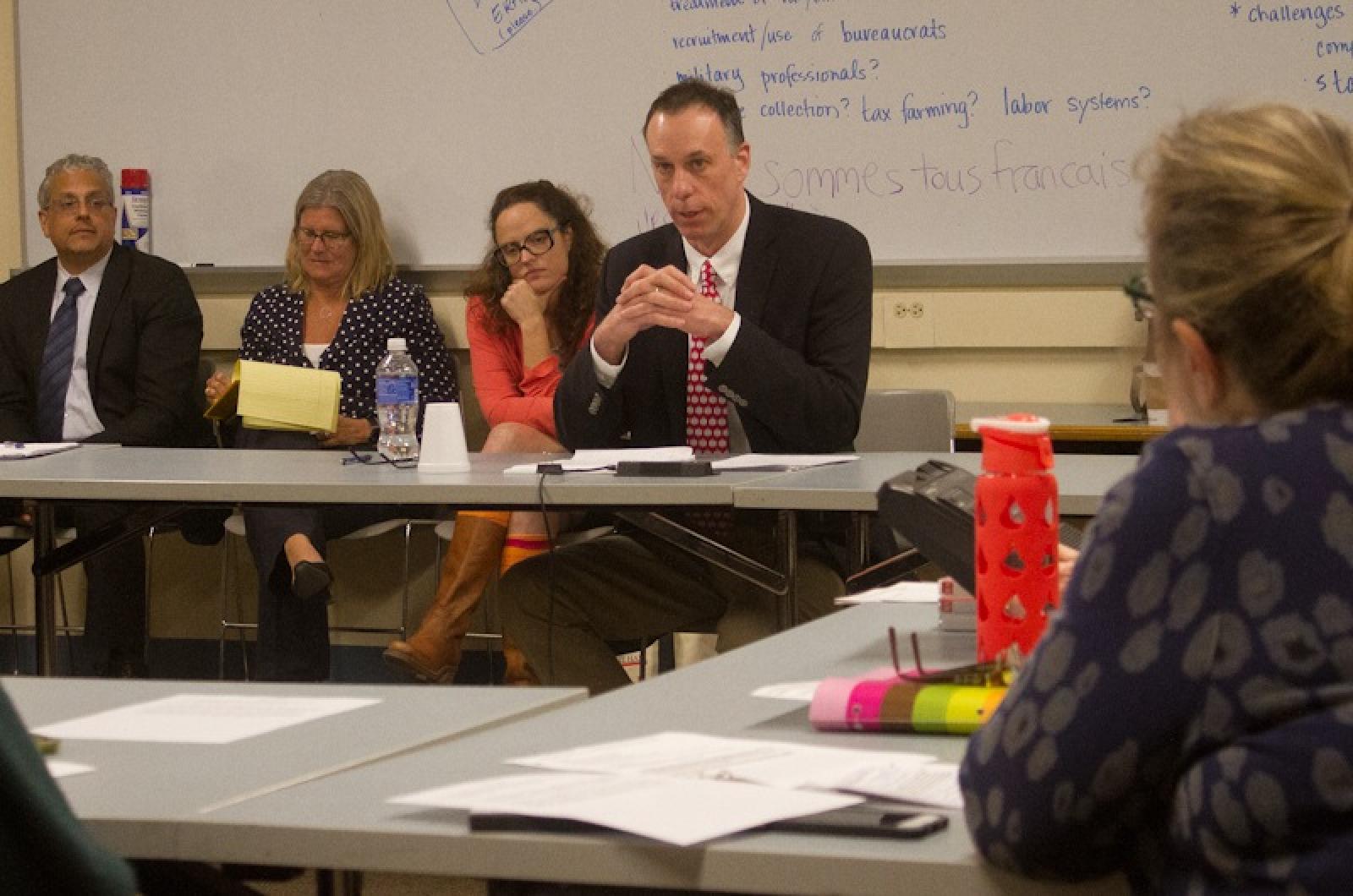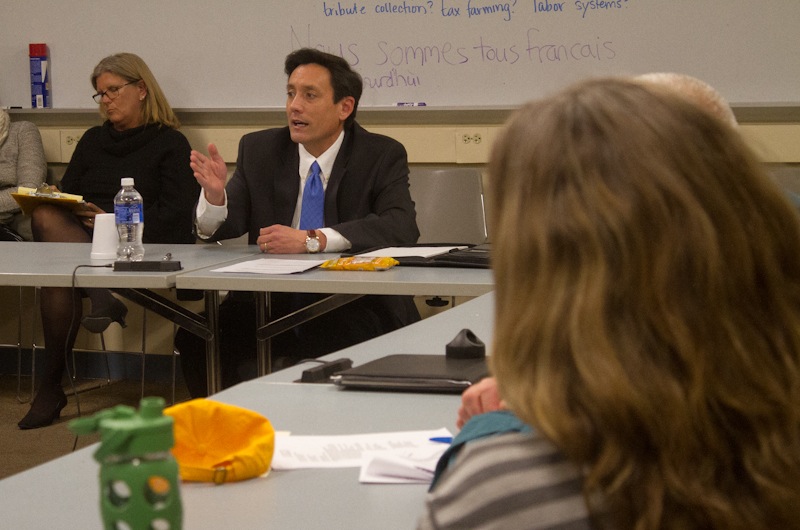In interviews this week, two final candidates for Vineyard schools superintendent talked about their career tracks, the challenges that lie ahead for the widely disparate public school system on the Island and how they would address them.
“The person you hire for this position has to understand that this is a unique place, that the Island community prides itself on providing an education for the students that allows them to be who they are. But you also need to hire someone who has experience with other aspects of the job,” said assistant superintendent Matthew D’Andrea in his interview Wednesday.
“Dr. Weiss is someone who can’t be replaced, and I frankly fear the void that he’s going to create when he leaves,” said Oak Bluffs School principal Richard Smith in his interview Thursday. “Though I present as a somewhat laid-back person, I feel I possess the skill set not to fill the void, but to help fill the void.”
Mr. D’Andrea and Mr. Smith were named as finalists last week by the all-Island school committee. The committee will make a final decision at a public meeting next Wednesday at 7 p.m. in the high school library conference room.
In separate interviews on Wednesday and Thursday, each was asked the same series of questions, ranging from their experience with contract negotiations to how they would work with outgoing superintendent Dr. James H. Weiss, who will retire at the end of the school year.
Both men pointed to their experiences as solid preparation for the job.
Mr. Smith came to the Island in 2002 as assistant principal of the Tisbury School and in 2007 was named principal of that school. In 2011 Mr. Weiss tapped him to take over as principal at the Oak Bluffs School.
He began his teaching career in his home state of Virginia, where he worked with special needs students, and later taught eighth grade civics. He then became a middle school guidance counselor before teaching high school history in Western Albemarle, Va. He and his wife, who teaches in Oak Bluffs, initially decided to apply for jobs on the Vineyard because they had honeymooned here.
When he was named principal of Oak Bluffs, the school had been labeled underperforming and he was charged with bringing the achievement levels up. He was successful, crediting the staff at the school for their hard work and willingness to make changes for the benefit of the students.
“You have to do that in the very real environment of budgetary constraints and reduction in staff and resources,” he said. “Those were all challenges that kind of squeeze you. One of the things the Tisbury staff taught me was that they carried the school, and knowing that the same kind of talent was at Oak Bluffs, I felt I had to put people together to collaborate.” He worked with staff on curriculum and on taking a broad K-through-eight view rather than a grade-by-grade view.
“We addressed gaps and places that we failed to address for our children, and also redundancies,” Mr. Smith said. “People were able to take on different standards. We have increased our rigor at Oak Bluffs starting in kindergarten and all the way up through eighth grade.”
Mr. Smith spoke of “looking ahead and planning backward,” particularly with regard to the rising special education budget.
“Don’t make cuts for cuts sake,” he said. “We can’t just look at something growing and say We’re going to cut that, because invariably it ends up costing more if we’re not thoughtful.” He said he would carefully look at the programs to measure their effectiveness, and whether they were achieving their goals.
He said while he had not had any direct involvement with contract negotiations, he is very familiar with public schools contracts thanks to his time as principal, and that he would draw on his guidance counselor experience.
“In a counseling program, you’re formally trained to negotiate, mediate, and most importantly, to truly, truly listen,” he said.
Mr. D’Andrea was hired as assistant superintendent in August 2013, and served briefly as interim principal of the regional high school last spring.
He taught in elementary schools in Fall River and Wareham before becoming an assistant principal in Marion. He was principal of the Old Hammondtown School in Mattapoisett for five years, and for part of that time was also a member of the Bridgewater-Raynham regional school committee.
Like Mr. Smith, he was charged with turning around an underperforming school while at Old Hammondtown. It was his first experience as an administrator and he too was successful. He said he set out to create a good climate in the building by meeting with the entire school every day before classes in an assembly, and spoke of the specific challenge of putting a new writing program into place at the school.
“I had pushback and resistance because there was already a program in there, and I had a teacher say, then why don’t you come in and teach it?” he recalled. So he did. “By getting up and writing in front of the students as an example, they would see how I struggled with sentence structure and reorganizing. They really got the idea that writers don’t just write, and it’s a process . . . the teacher really liked it, and that was a really pivotal moment because it turned her attitude around,” he said.
He said he learned a great deal during his time heading the high school following Steve Nixon’s sudden resignation last spring.
“What needs to be taken care of between now and that time of year: graduation, senior events, what to do about evaluations that prior principal had been doing — I had to work with the union to smooth that out,” he said.
He said one of his goals as superintendent would be addressing teacher retention; he said he was struck by the number of teachers who left the schools because they could not afford to live on the Vineyard. He also said he would work toward universal preschool, which he said would save the district money in the long run, because early learning would help ensure that students did not fall behind. He said he would look for examples to Mashpee and Wellfleet, where universal preschool has been adopted.
He spoke of establishing a strategic planning group with school and town officials to set long-term goals for the Island while maintaining the uniqueness of each individual district.
“They all have their own flavor, and that’s good. We need to preserve that, but we have a lot in common,” he said.
He said he would begin to look at the rising costs of the shared services and special education budgets. “No student is going to lose services, but I’m confident we can do it economically,” Mr. D’Andrea said.
As for contract negotiations, Mr. D’Andrea said he had been involved with the current process as assistant superintendent and had learned a great deal while he was a teacher on the Bridgewater-Raynham school committee.
“The superintendent then — I really liked the way he did things,” he said. “There was no strategy other than “This is what we can do, this is the situation in the town. I want to give you guys as much as I can.”
He said his fiscal style is conservative. At Old Hammondtown, he said, “I had a zero-based budget. I had to learn to do better with the resources I had.”
In closing remarks, both candidates thanked the school committee for the opportunity, and said they had been overwhelmed by the support they had already received from community members.
“We have a lot to think about,” concluded school committee member Dave Rossi.








Comments
Comment policy »